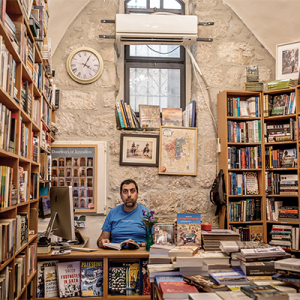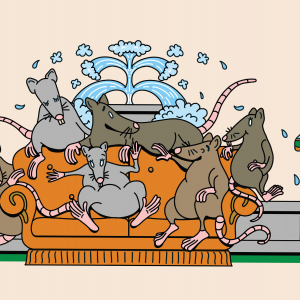
Greta Lapp Klassen (she/her) grew up in Goshen, Ind., and graduated from Goshen College with majors in English and art, and a minor in writing. Between high school and college, Greta did a service year in Bolivia with Mennonite Central Committee, living and working in Santa Cruz de la Sierra. While in college, Greta served as the executive editor of her school’s newspaper, The Record; during her time on staff, she wrote for every section of the paper (except sports), worked on the layout team, and contributed illustrations and comics. In her free time, she loves to swim, bake, make art, read, and write fiction.
Posts By This Author
They Came for the Books First
IN MAY 1933, Nazi-influenced student groups publicly burned more than 25,000 books by Jewish authors and those deemed liberal or leftist in 34 university towns across Germany. Newspapers supported it as “action against the un-German spirit,” and Joseph Goebbels, Hitler’s minister of propaganda, said to a crowd of 40,000 that “the era of extreme Jewish intellectualism is now at an end. ... The future German man will not just be a man of books, but a man of character.”
This antisemitic act of censorship and intolerance is memorialized at the Yad Vashem Holocaust History Museum in Jerusalem, where a display about book burnings sets the tone for the rest of the museum. Before you enter the display on the rise of Nazism, you must first consider the gravity of book burnings. A prophetic quote from 19th century German poet Heinrich Heine concludes the display: “Where books are burned, human beings are destined to be burned too.”
Across the city, in East Jerusalem, is the Palestinian-run Educational Bookshop. It consists of an English store, which doubles as a coffee shop, workspace, and community hub, and an Arabic store across the road. This family-owned business, which opened in 1984, sells all sorts of titles related to Palestine. There are Palestinian books on cooking, art, and history; there are novels, textbooks, and children’s books. The Educational Bookshop carries titles that are hard to find within Israel, and on a Sunday afternoon in February, this popular bookstore was raided by undercover Israeli police for the first time.
“They came into the shop with a search warrant,” Ahmad Muna, assistant manager of the shop, told me. “They demanded a search that happened over the course of two hours. The officers were aggressive, brutal, were not polite.” According to Muna, the officers didn’t speak Arabic or English; at first they used Google Translate to figure out book titles.
“At some point they had enough of Google Translate,” Muna said, “It was getting too tedious. So, they started to judge the books by their covers, by the design, by the picture on the cover, any book that had the flag of Palestine, any book that had a picture of a prisoner, of a boy being arrested, a picture of the wall, a picture of a Palestinian flag, it was confiscated.”
Police took away about 300 books in trash bags. Muna and his uncle were arrested and detained for two nights. After release, both were put under house arrest for five days and banned from entering their shop for more than two weeks.
God Loves Fat People As They Are. Can We?
Travel back in time with me to the early 2000s: Celebrities were openly fat-shamed in tabloids, and supermarkets were overrun by all things “low” — low-calorie, low-fat, low-carb, low-sodium, or low-sugar. Diets like Atkins, paleo, keto, raw foods, and juice cleanses abounded. TV shows like “The Biggest Loser” and “My 600-lb Life” were used to paint fat people as lazy, undisciplined, and disgusting.
Joining a Church (or Knitting Club) Could End the Loneliness Epidemic
Join or Die is described in promotional materials as, “A film about why you should join a club...and why the fate of America depends on it.” Featuring heavy-hitters like former Secretary of State Hillary Clinton, Secretary of Transportation Pete Buttigieg, Surgeon General Vivek Murthy, along with many influential scholars, the film argues that the loneliness epidemic is a threat to democracy and the public health of the nation.
Did Kacey Musgraves Write ‘Cardinal’ for Me?
AFTER MY GRANDMA died, I began to pay attention to cardinals. She loved watching birds through her kitchen windows, and the memorial cards at her funeral displayed an illustration of a cardinal. After that, every cardinal I saw felt like a message sent by my grandma from heaven, reminding me that she was looking out for me, and that she wasn’t really gone, not fully.
So, when I listened to “Cardinal,” the first track on Kacey Musgraves’ latest album Deeper Well, I felt like Musgraves wrote the song for me.
“Cardinal,” she sings, “are you bringing me a message from the other side?”
With songs about finding peace and falling in love, growing up and maturing, Deeper Well is spiritually grounding. A reminder to slow down, go outside, and appreciate what we have.
Rats Are Just Friends You Haven’t Met Yet
WHEN I MOVED to Washington, D.C., the second thing I noticed was the rats. (The first was that D.C. drivers are more aggressive than those from Indiana. I’ve since learned to use my horn liberally.)
I’m not proud of my initial response to these furry children of God. I shrieked. I complained. I was frightened to go outside at night, because with every step I took, I heard them scurrying. I could practically feel their long, pink tails tickling my ankles. I filled their burrows with dirt and rocks, covering them with bricks. I was proud of my resourcefulness, until I found the bricks shoved aside and the burrows reestablished. These rats were strong and resilient. Touché, rats. Touché.
As winter approached, the rat population shrank. Small communities could still be found dwelling near dumpsters, and I realized that like me, the rats were just trying to survive. I began learning about the plight of the urban rat and became convicted that as Christians committed to social justice, we must open our hearts to Rattus norvegicus.
You might roll your eyes and ask, “Is a Christian response to rats really necessary?” I assure you, it is. We don’t bat an eye at squirrels (also rodents), yet we are universally disgusted by rats, which are, in case you’ve forgotten, also part of God’s creation. We are so possessive over our trash that we would rather kill the rats than let them enjoy our chicken bones. We must do better.
That’s why I’m launching NIBBLE (Nonviolent Interventions By Bible-Loving Evangelicals), a nonprofit focused on improving human-rat relations in accordance with the gospel. Here’s a preview of our five-step plan for building Beloved Community with neighborhood rats:
I Was Arrested While Singing Hymns for Cease-Fire in Gaza
Earlier this year, I was arrested alongside more than a hundred other Mennonites in Washington, D.C., as we raised our voices in song, demanding that our elected officials call for a cease-fire in Gaza. Being a part of this act of peaceful civil disobedience, organized by Mennonite Action, gave me a sense of clarity about my faith that I had sought for years. As Capitol Police officers zip-tied my wrists behind my back, I sang louder and thought to myself: “This is what it means to be a Christian. This is what pacifism meant to my Mennonite ancestors.”
In ‘Dawn of the Nugget,’ No Chicken Is Free Until All Chickens Are Free
More than 23 years after the box office hit Chicken Run came out, Aardman Animations has finally released a sequel: Chicken Run: Dawn of the Nugget is a punny, thrilling, and slightly disturbing homage to the art of claymation, with abundant lessons about collective liberation, trauma, and parenting.






